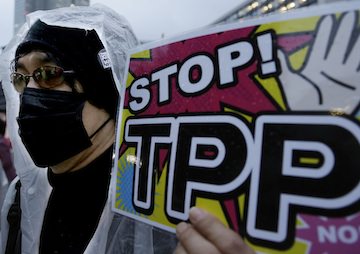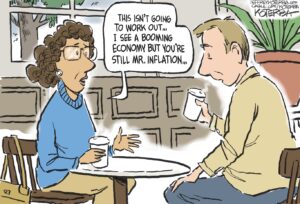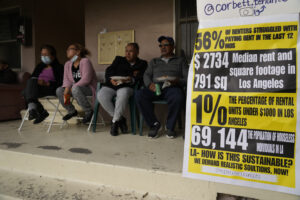TPP Is ‘Fundamentally Flawed’ and Should Be Resisted, Says U.N. Human Rights Expert
Alfred de Zayas, the United Nation's independent expert on the promotion of democratic and equitable international order, said the Trans-Pacific Partnership "is fundamentally flawed and should not be signed or ratified unless provision is made to guarantee the regulatory space of [s]tates." A 2014 protest in Tokyo against the Trans-Pacific Partnership agreement. (Shizuo Kambayashi / AP)
A 2014 protest in Tokyo against the Trans-Pacific Partnership agreement. (Shizuo Kambayashi / AP)
The leading United Nations expert on human rights is calling upon the 12 nations considering the Trans-Pacific Partnership to reject the trade agreement, out of concern that it “is out of step with today’s international human rights regime.”
Alfred de Zayas, the U.N.’s independent expert on the promotion of democratic and equitable international order, said the TPP “is fundamentally flawed and should not be signed or ratified unless provision is made to guarantee the regulatory space of [s]tates.”
“I am concerned that notwithstanding enormous opposition by civil society worldwide, twelve countries are about to sign an agreement, which is the product of secret negotiations without multi-stakeholder democratic consultation,” de Zayas said in a statement ahead of Thursday’s meeting in New Zealand of trade representatives for the 12 Pacific Rim nations involved in the secretive talks over the TPP.
“Trade agreements are not ‘stand-alone’ legal regimes, but must conform with fundamental principles of international law, including transparency and accountability,” de Zayas said. “[Trade agreements] must not delay, circumvent, undermine or make impossible the fulfillment of human rights treaty obligations.”
From Russia’s RT:
De Zayas was referring to indications that the TPP will come with a private tribunal system, or an investor-state dispute settlement (ISDS) process, in which multinational corporate entities will be granted broad powers to challenge sovereign nations’ government regulations, rules, actions and court rulings if those laws or policies are perceived as cutting in on intellectual property values and profits.
The trade pact currently involves Australia, Brunei, Canada, Chile, Japan, Malaysia, Mexico, New Zealand, Peru, Singapore, the United States, and Vietnam. These nations together comprise 40 percent of the global economy. Other nations, such as Thailand and Cambodia, have expressed interest in eventually participating in the agreement.
Any economic benefits of the deal will go to corporations, not workers in any of the participating nations, opponents say. Labor unions, among many others, have lined up to oppose the TPP based on concerns over a number of issues, including currency manipulation, environmental and health protections, food safety, pharmaceutical monopolies, offshoring of jobs, internet privacy, government transparency, and local governmental control.
One of the most contentious sections of the TPP is the intellectual property chapter, which has been negotiated away from the public gaze – while major corporations and trade groups have had access and involvement – for the last five and a half years.
“If TPP is ratified, people in the Pacific-Rim countries would have to live by the rules in this leaked text,” said Peter Maybarduk, director of Public Citizen’s Global Access to Medicines Program, following a leaked release of the pact’s intellectual property chapter by Wikileaks in October. “The new monopoly rights for big pharmaceutical firms would compromise access to medicines in TPP countries. The TPP would cost lives.”
Leaked drafts of TPP negotiations have suggested that corporations would be allowed to sue governments in private courts over lost profits due to regulation, elevating corporate entities to the status held by sovereign nations.
De Zayas said the ISDS system would be “fundamentally imbalanced and unjust, since investors can sue governments whereas governments cannot sue investors before these ad hoc tribunals.”
Read more here.
–Posted by Roisin Davis
Your support matters…Independent journalism is under threat and overshadowed by heavily funded mainstream media.
You can help level the playing field. Become a member.
Your tax-deductible contribution keeps us digging beneath the headlines to give you thought-provoking, investigative reporting and analysis that unearths what's really happening- without compromise.
Give today to support our courageous, independent journalists.






You need to be a supporter to comment.
There are currently no responses to this article.
Be the first to respond.